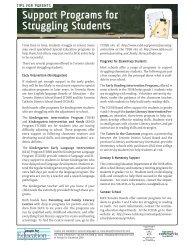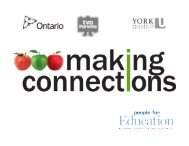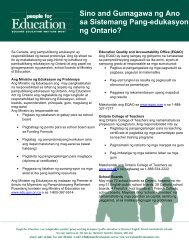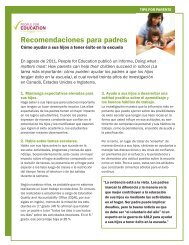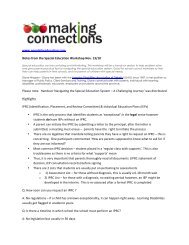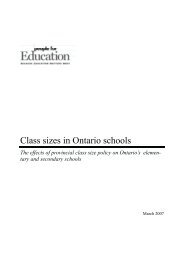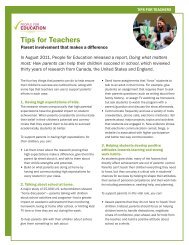Our Children Our Future Our Vision - People for Education
Our Children Our Future Our Vision - People for Education
Our Children Our Future Our Vision - People for Education
You also want an ePaper? Increase the reach of your titles
YUMPU automatically turns print PDFs into web optimized ePapers that Google loves.
<strong>Our</strong> <strong>Children</strong>, <strong>Our</strong> <strong>Future</strong>, <strong>Our</strong> <strong>Vision</strong><br />
ment will always retain total control over the level and allocation of resources needed to operate<br />
First Nation schools. 193 Worse, is the fact that the First Nation’s education authority must comply<br />
with all federal directives, policies, rules and timelines or be subject to reprimand or additional<br />
controls. 194<br />
Although Canada bears a fiduciary responsibility <strong>for</strong> education, that does not give it the right<br />
to control it. 195 The use of words like “expanded” or “increased” in education or related funding<br />
agreements are weasel words used to give the appearance of something more than what it is:<br />
government-controlled education. 196 It is time to fully recognize and implement First Nation jurisdiction<br />
over education – completely and unconditionally.<br />
The basic framework to full recognition and implementation of First Nation jurisdiction over education<br />
includes two major components: (1) the full recognition of First Nation jurisdiction over education<br />
which stems from their inherent right to be self-determining; (2) the renegotiation of funding<br />
arrangements to provide adequate, stable, flexible comprehensive funding. 197 There are many different<br />
options of how to do this, but there can be no one-size-fits-all policy as Indigenous Nations<br />
have very different cultures, communities, and educational objectives. 198<br />
While ideas like school boards may well be necessary in some areas, given the size of some communities,<br />
those are the kinds of details that First Nations, in full control of their own systems, can<br />
decide <strong>for</strong> themselves based on their own needs and goals. 199 Only with significant change, an<br />
equitable financial commitment and local control of education can we ever hope to eradicate a<br />
century of educational neglect by Canada. 200<br />
First Nation jurisdiction over education must be complete and unconditional – with no federally<br />
imposed one-size-fits-all solutions or new policy limitations.<br />
193 Investing in the <strong>Future</strong>, supra note 175 at 6.<br />
194 Ibid.<br />
195 E. Johnson, D. Longboat, “Sovereignty, Jurisdiction and Guiding Principles in Aboriginal <strong>Education</strong> in Canada”<br />
(1986) 1 Can. J. N.S. 173-179 [Sovereignty].<br />
196 Harvey McCue Consulting “Self-Government Agreements and Jurisdiction in <strong>Education</strong>” (5 April 1999) [Self-Government]<br />
at 25-27.<br />
197 First Nations <strong>Education</strong>al Jurisdiction, supra note 181 at 25. Indian Control of Indian <strong>Education</strong>, supra note 99. RCAP,<br />
supra note 6. Many others have made the very same recommendations as can be seen in the review of previous<br />
reports.<br />
198 Self-Government, supra note 196 at 22-27.<br />
199 See <strong>for</strong> example: M. Mendelson, Caldedon Institute of Social Policy, “Aboriginal <strong>People</strong>s and Post-Secondary <strong>Education</strong><br />
in Canada” (2006), online: at 7. He has also suggested<br />
ministries or regional education authorities in addition to school boards.<br />
200 Treaty Right, supra note 35 at 14.<br />
47 Chiefs of Ontario



